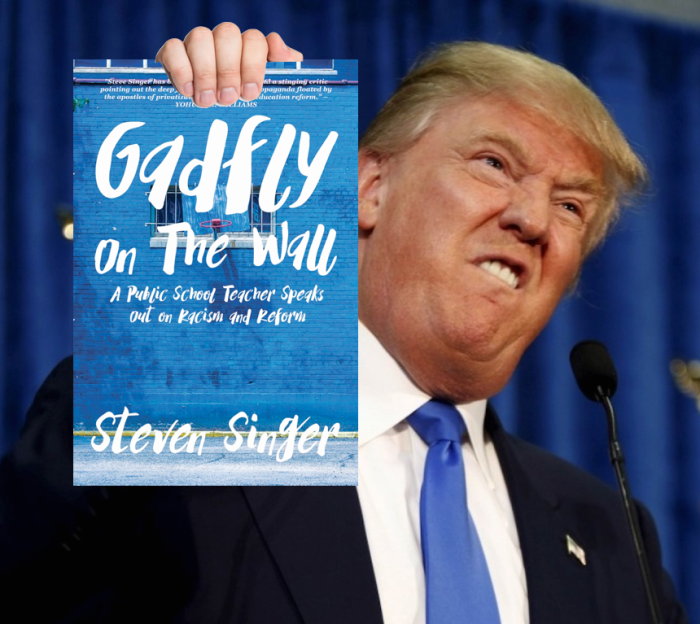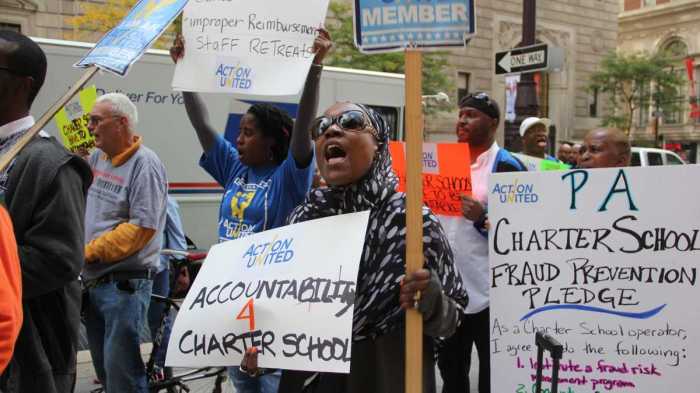
They say history is written by the victors.
But fortunes change, and sometimes you can even reclaim a figure from the past who the last round of winners had cast in an unlikely role.
Take Rosa Parks.
She is universally hailed as a hero of the civil rights movement because of her part in the Montgomery Bus Boycott.
Everyone knows the story. Parks, a black seamstress in Alabama, refused to give up her seat to a white man on a segregated bus and was arrested. Then working with the National Association for the Advancement of Colored People (NAACP), Dr. Martin Luther King, Jr., and many other activists, she helped encourage black people throughout the city to stop riding the buses until they were eventually desegregated.
But did you know that 40 years later after she had moved to Detroit, Parks tried to open a charter school?
It’s true – from a certain point of view.
And school privatization cheerleaders are quick to reference her advocacy.
President Bill Clinton used the anecdote to sell the charter school concept in a speech to the NAACP in Pittsburgh in 1997.
Joe Nathan, one of the authors of the first charter school law, still likes to troll readers of this blog by bringing that factoid up in the comments.
Keri Rodrigues, one of the founders of the Walton front group the National Parents Union, uses it like a trump card on Twitter to shut down privatization critics.
The facts are somewhat more complicated.
CHARTER SCHOOL CRITICISM
Charter schools are funded with tax dollars but not bound by the same regulations as authentic public schools including the need to be run by elected school boards. In fact, they are often operated by appointed business interests.
Today charter schools are roundly criticized for their limited accountability, lack of local control, tendency to profit off the children they serve, ability to cherry pick students enrolled in them, propensity for draining funding from neighborhood public schools, frequently poor academic records, and inclination to increase racial and economic segregation.
Yet lobbyists and industry insiders insist they are civil rights reforms. Being able to tout Parks as a charter pioneer helps them make their case.
But did she really do this?
I mean Parks went to segregated schools, herself, before Brown v. Board. You’re telling me she actually advocated to start a segregated school in Detroit decades later?
THE FACTS
Parks did lend her name to a charter school proposal in 1997 that would have opened an institution named for her and her late husband, the Raymond and Rosa Parks Academy for Self Development.
However, according to Anna Amato, an education consultant who worked with Parks on the proposal, the Detroit Board of Education put the item on their agenda but took no action.
Parks then moved on to other concerns – of which she had many.
She spent most of her life fighting the good fight.
In 1957 she moved with her husband and mother to Detroit, where from 1965 to 1988 she was a member of the staff of Michigan Congressman John Conyers, Jr. She remained active in the NAACP fighting against housing segregation in the city, traveling to support Selma to Montgomery marches, developed “Pathways to Freedom” bus tours of civil rights sights, served on the Board of Advocates for Planned Parenthood, and many other actions.
The proposed charter school wasn’t exactly a highlight. Nor does it seem to fit with her other endeavors.
LEGAL BATTLE
But the Rosa Parks who was involved in that proposal was a very different lady than the one who refused to give up her bus seat all those years ago.
Parks was 84 at the time of the charter school plan and somewhat isolated from close family. When she died in 2005 at the age of 92, her estate was the subject of a bitter legal dispute.
The issue wasn’t the money so much as the priceless historical artifacts associated with her life.
Her will left most of the estate to Elaine Steele, a retired Detroit judge and friend of Parks who was also involved in the charter school proposal. She was co-director of Parks’ after-school program, the Raymond and Rosa Parks Institute for Self Development.
Parks, who was later diagnosed with dementia, had abruptly stopped giving interviews in 1995 and lived a mostly secluded life from then on.
Her family disputed that the will created in July 1998 represented Parks true intentions. They sued to challenge the estate plan, accusing Steele of using undue influence on Parks. After a protracted battle, the courts eventually sided with Steele.
But the picture this paints is not a friendly one.
We have an octogenarian Parks lending her name to numerous projects all under the direction of consultants.
QUESTIONABLE ASSOCIATES, QUESTIONABLE INVOLVEMENT
Amato, in particular, seems to have gone on to become a champion of school privatization and education technologies.
She made her name in Detroit pushing these policies for decades.
In 1994 she founded Edtec Central, an organization that helps launch and run charter schools. At one point the company operated “two specialized strict discipline academies and one alternative high school in Michigan” as well as provided support and consulting services to other local charter schools. However, there is very little current information on the organization. It’s unclear whether it is still in operation.
But as of 2017, Amato still was. She wrote an op-ed praising Donald Trump’s Education Secretary Betsy DeVos called “DeVos Is a Hero to Detroit’s At-Risk Kids.”
This appears to be the woman who advised Parks about opening a charter school.
How much Parks was involved is hard to say.
When The New York Times wrote an article about the proposed charter school in 1997 by Halimah Abdullah, Parks either refused to be interviewed or was left out of it. But Amato, Steele and even Nathan were quoted at length.
It’s hard to believe a journalist for the Times could be such a bad writer as just not to include Parks in the article, especially in a piece titled “Rights Hero Presses Plan For School In Detroit.”
It’s much more likely that Parks declined to be included or was purposely left out of the loop by her circle of handlers possibly to hide her slow mental deterioration.
It’s understandable why Parks may have surrounded herself with consultants and caregivers.
In 1994 when she was 81, Parks was robbed and assaulted in her home in central Detroit. The assailant, Joseph Skipper, broke down her door but claimed he had chased away an intruder. He requested a reward and when Parks paid him, he demanded more. Parks refused and he attacked her.
Parks was treated for facial injuries and swelling. Though Skipper, a black man, was eventually caught and prosecuted, the incident left Parks shaken and anxious to the degree that she moved from her house to a secure high-rise apartment.
Another peak into her personal life was revealed in 2002, when Parks received an eviction notice from her apartment for not paying rent. Both the Hartford Memorial Baptist Church and Little Ceasars owner Mike Ilitch claimed to have paid the bill, but Steele says the eviction notice came in error. Parks family blames the incident on financial mismanagement from caregivers. When NBC news reported the story, the network noted she had been diagnosed with dementia.
In total, these events provide a sad look at the last years of a civil rights icon. And it’s during this late period that the charter school project was developed.
Was it one of Parks’ passions? It’s impossible to tell. It is at least as likely that an elderly and suggestible Parks was surrounded by people who may have been using her name to get across their own agenda.
PARKS ON SEGREGATION
Consider how out of character a charter school was to Parks former legacy.
In 1995 (just two years before the charter school proposal) Parks did agree to an interview where she talked about the importance of education and reminisced on the evils of school segregation:
“Interviewer: Was there a teacher that influenced you?
Parks: My mother was a teacher and I went to the same school where she was teaching. My very first teacher was Miss Sally Hill, and I liked her very much. In fact, I liked school when I was very young, in spite of the fact that it was a one-room school for students all ages, from the very young to teens, as long as they went to school. It was only a short term for us, five months every year, instead of the regular nine months every year.
Interviewer: What was it like in Montgomery when you were growing up?
Parks: Back in Montgomery during my growing up there, it was completely legally enforced racial segregation, and of course, I struggled against it for a long time. I felt that it was not right to be deprived of freedom when we were living in the Home of the Brave and Land of the Free.”
These do not sound like the words of a woman who two years later would push for a segregated school to be opened in her name.
PARKS ON DESEGREGATION
Moreover, this flies in the face of her work at the Highlander Folk School in 1955. Before she participated in the bus boycott, she took a two-week workshop entitled “Racial Desegregation: Implementing the Supreme Court Decision.”The idea was to learn how she could encourage youth groups to push for desegregation.
The workshop was her first experience of an integrated learning environment. In a 1956 interview she said that she found “for the first time in my adult life that this could be a unified society, that there was such a thing as people of all races and backgrounds meeting and having workshops and living together in peace and harmony… I had heard there was such a place, but I hadn’t been there.”
Parks took copious notes during the sessions, detailing what each speaker said and her reactions to them. In one section she wrote, “Desegregation proves itself by being put in action. Not changing attitudes, attitudes will change.”
Her time there was brief but transformative. It led directly to her refusal to give up her seat and subsequent history of activism. To think that someone so committed to the cause of desegregation would willingly engage in its opposite staggers the mind.
But a lot can happen in the intervening decades.
Maybe she came to think that well resourced segregated charter schools were preferable to poorly resourced integrated public schools. However, she must have realized that when schools are integrated it is harder to withhold resources. Perhaps she gave up on integration in favor of Afrocentric charters, but that would be a fundamental change in her thinking, indeed.
IMPORTANCE FOR TODAY
If Parks did wholeheartedly support the charter school project proposed in her name during her twilight years, does it make a difference?
Not really. After all, lots of people make bad decisions – even civil rights heroes.
We remember these people not because of their biggest mistakes, but because of their biggest victories, how they struggled year-after-year in the cause of human dignity.
More important might be an analysis of whether Parks would likely support charter schools today if she were still alive and cognitively sound.
In truth, it seems unlikely that she would. After all, Parks was active in the NAACP all her life. Along with Black Lives Matter and the Journey for Justice, The NAACP voted almost unanimously just a few years ago to demand a moratorium on all new charter schools because they exploit children of color.
It’s easy to imagine Parks leading that charge.
But some folks will tell you Parks ideas of segregation were different than the dictionary definition and that she would be on the side of Betsy DeVos, not modern day civil rights activists.
MICHIGAN’S CHARTER SCHOOL FAILURES
It’s no accident I bring up DeVos.
Like Parks, DeVos’ home is in Michigan and she has had a tremendous effect on education throughout the state, in Detroit, and nationwide.
When Parks’ charter school proposal was issued, the concept was pretty new. The first charter school law in the nation had only been passed in 1991 in Minnesota. Michigan didn’t jump aboard until three years later.
No one knew then exactly what to expect of the policy or what these schools would end up becoming.
Now charter schools have been in Michigan for more than a quarter century and the results are in.
They are an absolute disaster.
A 2016 report from Education Trust-Midwest, a non-partisan research and advocacy organization, found 80 percent of charter schools in Michigan scored below the state average in math and reading proficiency tests.
Moreover, the state leads the nation in for-profit charter schools, according to research by Western Michigan University professor Gary Miron. Grand Rapids-based National Heritage Academies, alone, operates almost 50 for-profit charters throughout the state.
After an intensive investigation, in 2014 the Detroit Free Press criticized these kinds of schools for their lack of financial transparency and excessive overhead costs.
Maybe it’s my own lack of imagination, but I find it difficult to imagine Parks championing schools that get so much worse academic results than traditional public schools. I find it nearly impossible to imagine her fighting for the right to segregate black children into “separate but equal” schools.
INCONSISTENCIES
Charter school apologists will lump Parks in with Trump and DeVos. Not with the Rev. William Barber II, Jitu Brown, Ibram X. Kendi, Nikole Hannah-Jones, Yohuru Williams, Denisha Jones, and other prominent black people who oppose school privatization.
They tell us that Parks name on an application to start a charter school (her signature does not appear on the document) is enough to prove her support for the concept.
Yet never once that I can find did Parks ever speak out on what was allegedly her own proposal. Others spoke out on her behalf, but she declined to be interviewed when the media came calling and didn’t use her iconic status to get the publicity needed to bring it to completion.
Can you imagine a celebrity today opening a charter school named after themselves without even releasing a statement, not to mention a press conference and media blitz? And this wasn’t in the distant past. It was only 1997.
But the school privatization lobby tells us that this is so. And moreover that Parks – who worked her entire life battling the forces of segregation whether it be in our schools, housing or elsewhere – somehow turned against this aim in her last years to open this school.
It’s quite a story they’re telling.
However, the possibility that a declining Parks was convinced to put her name to a project she didn’t fully understand or support is at least as consistent with the facts as the privatization narrative – in fact, more so because it clarifies many inconsistencies.
SYMBOLISM VS FACTS
In any case, this is all conjecture.
Parks’ opinion – whatever it was – only has symbolic value.
The true measure of charter schools are the facts about how they operate and the results they get for students.
They have failed generations of children across the country.
They truly are a civil rights issue – but not the one the school privatization lobby thinks.
Every child has a right to be freed from charter schools and not subjected to them.
Nothing would be more in keeping with the spirit of Rosa Parks than a boycott of charter schools – just like today’s civil rights organization are demanding.
It’s time we as a nation refuse to give up our seats in the public schools and boycott the forces of privatization and profit.
The only way forward is together – not through segregation and exclusion hoping that at least some of us will make it.
Like this post? I’ve written a book, “Gadfly on the Wall: A Public School Teacher Speaks Out on Racism and Reform,” now available from Garn Press. Ten percent of the proceeds go to the Badass Teachers Association. Check it out!






























